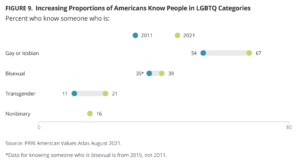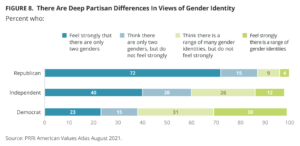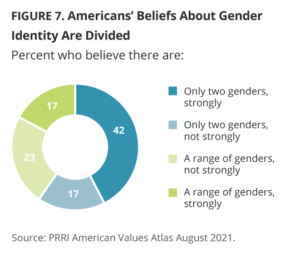As the Equality Act languishes in the U.S. Senate due to Republican opposition, the percentage of Americans who favor laws that protect LGBTQ people from discrimination in jobs, public accommodations and housing continues to increase.
Public Religion Research Institute released new data this week that shows a 6-point increase in those favoring legal protections since the beginning of this year. A PRRI report released in March showed 76% of Americans favoring legal protections for LGBTQ persons. New polling conducted in August shows that support now at 82%.
This continues a trend that has been on the rise since 2015. And despite the stark differences in the attitudes of elected officials, Americans report bipartisan support for these legal protections. Majorities of Republicans (67%), independents (85%) and Democrats (92%) favor nondiscrimination protections for LGBTQ persons.
Despite the stark differences in the attitudes of elected officials, Americans report bipartisan support for these legal protections.
The Equality Act would expand federal civil rights protections for gay, lesbian and transgender Americans. The House passed the bill in February but it is stalled in the Senate.
PRRI found that large majorities of Americans believe such civil protections already exist when, in fact, they do not.
Meanwhile, the polling firm found that 32% of Americans believe discrimination against lesbian and gay people has increased over the last 12 months, while 15% say it has decreased. Democrats (48%) are three times more likely than Republicans (15%) to see an increase in discrimination.
And keeping with previously reported trends, white evangelicals are less likely than any other religious group to say that discrimination has increased (16%). However, while white evangelical Protestants continue to be the least likely major religious group to support nondiscrimination policies, a majority (66%) does support such laws — a 6-point increase since 2015.
PRRI reports that large majorities of all major religious groups support LGBTQ nondiscrimination policies.
The latest PRRI survey delved into Americans’ views on a range of issues related to sexuality and gender identity:
- A majority of Americans (63%) oppose allowing small business owners to refuse service to LGBTQ people if doing so violates their religious beliefs, and only 36% support allowing religiously based service refusals. Republicans (61%) are more than three times as likely as Democrats (18%) to favor allowing businesses to refuse service to LGBTQ people. More than one-third of independents (36%) agree.
- White evangelical Protestants remain the only major religious group in which a majority favors religiously based service refusals for LGBTQ persons, and their support for these exemptions is increasing. Today, 62% of white evangelical Protestants say they support allowing small business owners to refuse to serve LGBTQ people, up from 54% in 2019 and 51% in 2015.
 Two-thirds of Americans (67%) say they know someone who is gay or lesbian. Four percent of Americans report that they themselves are gay or lesbian, 25% say a close friend is gay or lesbian, 31% say a family member is gay or lesbian, 28% say someone else they know is gay or lesbian, and 26% say they do not know anyone who is gay or lesbian. By comparison, in 2011, 54% of Americans said they knew someone who is gay or lesbian.
Two-thirds of Americans (67%) say they know someone who is gay or lesbian. Four percent of Americans report that they themselves are gay or lesbian, 25% say a close friend is gay or lesbian, 31% say a family member is gay or lesbian, 28% say someone else they know is gay or lesbian, and 26% say they do not know anyone who is gay or lesbian. By comparison, in 2011, 54% of Americans said they knew someone who is gay or lesbian.- Four in ten Americans (39%) report that they know someone who is bisexual. Five percent of Americans report that they themselves are bisexual, 14% say a close friend is bisexual, 11% say a family member is bisexual, 19% say someone else they know is bisexual, and 54% say they do not know anyone who is bisexual.
- One in five Americans (21%) know someone who is transgender. One percent of Americans report that they themselves are transgender, 5% say that a close friend is transgender, 6% say a family member is transgender, 11% say someone else they know is transgender, and 78% say they do not know anyone who is transgender. The percentage of Americans who say they know someone who is transgender has doubled since 2011.
- Four in 10 (39%) say discrimination against transgender persons has increased, 12% say discrimination has decreased, and 46% say it has stayed the same. About half of people who know someone who is transgender (49%) say that discrimination against transgender people has increased in the last 12 months, compared to just 36% of those who don’t know anyone who is transgender.
- Less than half of Americans (46%) strongly favor or favor allowing a transgender student assigned female at birth but who now identifies as male participating with other male students in high school athletic events. A slim majority (52%) oppose or strongly oppose this idea. This rare scenario has become the focus of major legislative efforts in states controlled by Republicans. PRRI found a nearly 50-point partisan gap on this question, with Democrats (68%) significantly more likely than Republicans (19%) to support allowing male transgender students to participate in high school athletic events with other male students.
 On the question of transgender student athletes, who you know makes a significant difference in attitudes. Six in 10 Americans (63%) who know someone who is transgender, compared to 43% of those who do not know someone who is transgender, favor allowing someone who was assigned female at birth but now identifies as male to participate in high school sports with cisgender male students.
On the question of transgender student athletes, who you know makes a significant difference in attitudes. Six in 10 Americans (63%) who know someone who is transgender, compared to 43% of those who do not know someone who is transgender, favor allowing someone who was assigned female at birth but now identifies as male to participate in high school sports with cisgender male students.- Americans are less likely to support participation in high school events by students who were assigned male at birth but who now identify as female. Only one-third of Americans (36%) believe these students should be allowed to participate in sporting events with their cisgender female classmates. About six in 10 (61%) are opposed to this policy.
- On the question of whether transgender persons should be allowed to use the public restrooms of the gender by which they identify, Americans remain conflicted. Passing so-called “bathroom bills” also has been a Republican legislative priority but with less success than the transgender sports bills. Currently, 47% of Americans favor the bathroom bills and 50% oppose them.
- Three in four Americans (75%) say they would be somewhat or very comfortable learning a coworker is transgender. Nearly seven in ten Americans (69%) say they would be somewhat or very comfortable having a close friend tell them they are transgender. A lesser majority of Americans (55%) say they would feel somewhat or very comfortable with their own child telling them they are transgender. All these positive affirmations are increases over previous years.
 However, a majority of Americans (59%) believes there are only two genders (male and female) with 42% believing this strongly. One in four Americans (23%) think there is a range of gender identities but do not feel strongly about it, while 17% believe strongly that there is a range of gender identities.
However, a majority of Americans (59%) believes there are only two genders (male and female) with 42% believing this strongly. One in four Americans (23%) think there is a range of gender identities but do not feel strongly about it, while 17% believe strongly that there is a range of gender identities.- White evangelical Protestants diverge from the general population significantly on the gender identity question, with 86% saying there are only two genders. That same view is held by 79% of Hispanic Protestants, 73% of Black Protestants, and 65% of white mainline Protestants.
Related articles:
Equality Act stirs passions about the definition of religious liberty and RFRA’s role
Baptist advocates for Equality Act say they are motivated by love of freedom as a faith virtue


